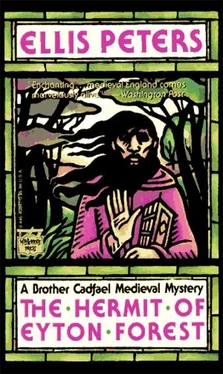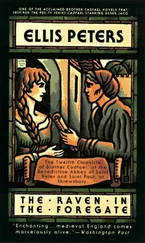Even then Paul was not at first alarmed or disturbed. The child was simply loitering somewhere, forgetful of time, and would appear at a run at any moment. But time slid by and Richard did not come. Questioned, the three boys remaining shuffled their feet uneasily, shifted a little closer together to have the reassurance of shoulder against shoulder, shook their heads wordlessly, and evaded looking Brother Paul in the eye. The youngest in particular looked less than happy, but they volunteered nothing, which merely convinced Paul that Richard was deliberately playing truant, that they were well aware of it and disapproved but would not let out one word to betray him. That he refrained from threatening them with dire penalties for such refractory silence would only have confirmed Jerome in his black disapproval of such an attitude. Jerome encouraged tale-bearers. Paul had a sneaking sympathy with the sinful solidarity that would invite penalties to fall on its own head rather than betray a companion. He merely stated firmly that Richard should be called to account for his behaviour later and pay the penalty of his foolishness, and proceeded with the lesson. But he was increasingly aware of his pupils' inattention and uneasiness, and the guilty glances they slid sidelong at one another over their letters. By the time they were dismissed he felt that the youngest, at any rate, was on the verge of blurting out whatever he knew, and his very distress argued that there was more behind this defection than the mere capricious cutting of a class.
Paul called the child back as they were leaving, half-gratefully, half-fearfully. “Edwin, come here to me!”
Understandably, the other two fled, certain now that the sky was about to fall on them, and in haste to avoid the first shock, whatever followed later. Edwin halted, turned, and slowly trailed his way back across the room, his eyes lowered to the small feet he was dragging reluctantly along the boards of the floor. He stood before Brother Paul, and trembled. One knee was still bandaged, and the linen had slipped awry. Without thinking, Paul unwound it and made it neat again.
“Edwin, what is it you know about Richard? Where is he?” The child gulped out with utter conviction: “I don’t know!” and burst into tears. Paul drew him close and let him bury his nose in a long-suffering shoulder.
“Tell me! When did you last see him? When did he go?” Edwin sobbed inarticulately into the rough woollen folds, until Paul held him off and peered into the smudged and woeful face. “Come! Tell me everything you know.”
And it came out in a flood, between hectic sniffs and sobs. “It was yesterday, after Vespers. I saw him, he took his pony and rode out along the Foregate. I thought he’d come back, but he didn’t, and we were frightened—We didn’t want him to be caught, he’d be in such terrible trouble—We didn’t want to tell, we thought he’d come back and no one need know…”
“Do you tell me,” demanded Paul, appalled and for once sounding formidable, “that he did not sleep here in his bed last night? That he’s been gone since yesterday and not a word said?”
A fresh burst of despairing tears distorted Edwin’s round flushed face, and his violently nodding head admitted the impeachment. “And all of you knew this? You three? Did you never think that he might be hurt somewhere, or in danger? Would he stay out all night willingly? Oh, child, why did you not tell me? All this time we’ve lost!” But the boy was frightened enough already, there was nothing to be done with him but hush and reassure and comfort him, where reassurance and comfort were very hard to find. “Now, tell me—you saw him go, mounted. After Vespers? Did he not say what he intended?” Edwin, very drearily, gathered what sense he had left and fumbled out the rest of it. “He came too late for Vespers. We were down on the Gaye, by the river, he didn’t want to come in, and when he did run after us it was too late. I think he waited to try and slip in with us when we came out of church, but Brother Jerome was standing talking to—to that man, the one who…” He began to whimper again, recalling what he should not have seen, but of course had, the bearers of the litter coming in at the gatehouse, the bulky body motionless, the powerful face covered. “I waited at the school door,” whispered the tearful voice, “and I saw Richard come running out and down to the stables, and then he came back with his pony, and led it out at the gate in a great hurry, and rode away. And that’s all I know. I thought he would soon come back,” he wailed hopelessly. “We didn’t want to get him into trouble…” If they had recoiled from doing that, they had certainly given him ample time and scope to get himself into trouble, deeper than any disloyalty of theirs might have plunged him. Brother Paul resignedly shook and patted his penitent into relative calm.
“You have been very wrong and foolish, and if you’re in disgrace it’s no more than you deserve. But answer everything truthfully now, and we’ll find Richard safe and sound. Go now, at once, and find the other two, and the three of you wait here until you are sent for.”
And Paul was off at a shaken run to take the bad news first to Prior Robert and then to the abbot, and then to confirm that the pony Dame Dionisia had sent as bait to her grandson was indeed gone from his stall. And there was great clamour and running about and turning grange court and barns and guest halls inside out, in case the culprit had not, after all deserted the enclave, or for sounder reasons had returned to it furtively, to try and conceal the fact that he had ever left it. The wretched schoolboys, tongue-lashed by Prior Robert and threatened with worse when anyone had time to perform it, cowered shivering and reduced to tears by the enormity of what had seemed to them good intentions, and having survived the first storm of recriminations, settled down stoically to endure the rest supperless and outcast. Not even Brother Paul had time to offer them any further reassuring words, he was too busy searching through the complex recesses of the mill and nearer alleys of the Foregate. Into this frenzy of alarm and activity Cadfael came riding in the early evening, after parting from Hugh at the gate. This very night there would be sergeants out dragging the woods from Eyton westward for the fugitive who might or might not be Brand, but must at all costs be captured. Hugh was no fonder of manhunts than was Cadfael, and many a misused serf had been driven at last to flight and outlawry, but murder was murder, and the law could not stomach it. Guilty or innocent, the youth Hyacinth would have to be found. Cadfael dismounted at the gatehouse with his mind full of one vanished youngster, to be met by the spectacle of agitated brothers running hither and thither among all the monastic buildings in search of a second one. While he was gaping in amazement at the sight, Brother Paul came bearing down upon him breathless and hopeful. “Cadfael, you’ve been in the forest. You haven’t seen hide or hair of young Richard, have you? I’m beginning to think he must have run home…”
“The last place he’d be likely to go,” said Cadfael reasonably, “while he’s wary of his grandmother’s intentions. Why? Do you tell me you’ve mislaid the imp?”
“He’s gone—gone since last night, and we never knew it until an hour ago.” Paul poured out the dismal story in a cascade of guilt and remorse and anxiety. “I am to blame! I have failed in my duty, been too complacent, trusted them too far… But why should he run away? He was happy enough. He never showed signs…”
“Doubtless he had his reasons,” said Cadfael, scrubbing thoughtfully at his blunt brown nose. “But back to the lady? I doubt it! No, if he went off in such haste it was something new and urgent that sent him running. Last night after Vespers, you said?”
Читать дальше












